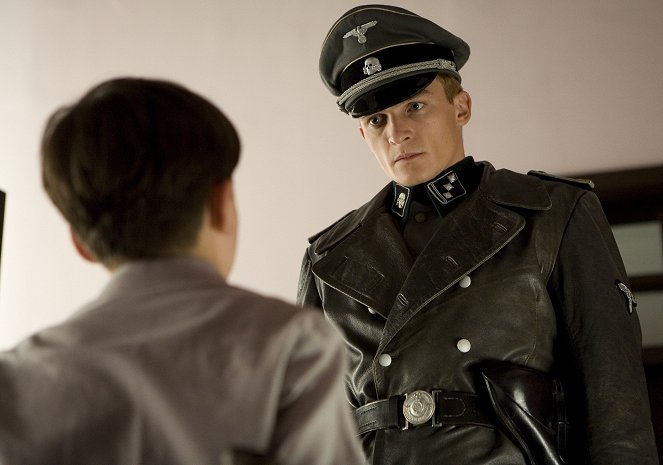Regie:
Mark HermanDrehbuch:
Mark HermanKamera:
Benoît DelhommeMusik:
James HornerBesetzung:
Asa Butterfield, Jack Scanlon, David Thewlis, Vera Farmiga, Rupert Friend, Richard Johnson, Sheila Hancock, Cara Horgan, Amber Beattie, David Hayman (mehr)Streaming (3)
Inhalte(1)
Anfang der 1940er Jahre. Der achtjährige Bruno verlässt mit seiner Familie die Stadt Berlin. Sein Vater, ein hochrangiger SS-Offizier, übernimmt eine Kommandantur im Osten des Landes. Bei den Streifzügen durch die neue Umgebung begegnet Bruno dem jüdischen Buben Shmuel, der in Häftlingskleidung hinter Stacheldrahtzaun gefangen ist. Weder ahnt Bruno, welch grauenvolles Verbrechen auf dem abgesperrten Terrain begangen wird, noch, dass sein Vater die Verantwortung für das KZ trägt. Aus der Begegnung der Buben entwickelt sich Freundschaft, aus dem vermeintlichen Abenteuer eine Tragödie. (ORF)
(mehr)Kritiken (5)
Eine sensible, naive bis leicht kitschige US-amerikanische Fassung vom Holocaust "für die ganze Familie“ (auch dank Horners süßem Klavier). Was nicht schlecht sein müsste, weil es um eine Kinderwahrnehmung der Welt geht. Es könnte sogar für Grundschulen geeignet sein, es würde den Schüler*innen interessanter als langweilige Lehrbücher erscheinen. Sie könnten sich perfekt mit der Hauptfigur identifizieren. In meinen Augen verliert der Film aber aus folgendem Grund an Glaubwürdigkeit: das Drehbuch benutzt billige Zufälle (Wenden), um zu dem herzzerreißenden und tragischen Finale zu gelangen. Ein bittersüßes Kalkül, das mit einem ausgearbeiteten Drehbuch in den Händen von Haneke oder Polański zum großen Film werden konnte.
()
The film as a whole struck me. I'm glad it's not unnecessarily drawn out and lengthy, but I was quite bothered by the predictability of the ending. It did build up a lot of emotion, but part of me was disappointed. A wonderful acting performance in my eyes was given by Vera Farmiga. The thoughtfulness and innocence of little Bruno sometimes entertained me, sometimes made me sad. The main weapon here is the strong subject matter and right after that the quality dialogue. It's a close one, but I’m giving it 5 stars.
()
The Boy in the Striped Pyjamas is exactly the kind of film that often excels in the Oscar race - an emotionally heightened drama that teeters on the edge of kitsch and has very little in common with the history and reality of the era in which it takes place. With all due respect to the subject matter - or perhaps because of it - I have to say that this is a schematic film with a contrived plot and schematic characters. Its only merit, besides decent execution and the participation of quality actors (which is not insignificant in today's times), is the reminder of the dark side of World War II. However, it does so superficially, to the point where it sometimes hurts. At times, the film resembles an unintentional parody, as the son of a concentration camp commandant casually roams around the camp fence and converses with an interned boy. The anti-Semitic program practically began with the rise of the Third Reich and aimed to separate Jews from the rest of the population and minimize any contact with them. This was accomplished through the initial requirement to wear yellow stars, prohibitions on certain professions, the creation of ghettos, as well as bans on going to cinemas, and theaters, shopping in non-Jewish stores, and many other measures. The concentration camps were intended to complete this isolation regardless of the so-called final solution. The barbed wires and guarded areas were meant not only to prevent prisoners from escaping but also to prevent any contact with the outside world. Here, the boys play chess directly under the watchtower, where the guard probably took a long nap. There are plenty of obvious nonsense moments, and in the case of this film, it is not a stylization à la Benigni and his famous film Life is Beautiful, which explains the naivety of the story with idealized memories of a man who reminisces about his father after decades. By the way, the naivety of the boy is exaggerated, as children do not believe in storks, and an 8-year-old boy cannot be expected to have such naïve thought processes. This would correspond to a child's thinking at the age of consuming Winnie the Pooh, so around five years old. It didn't make me mad, though. Vera Farmiga is charming, and the child actors give convincing performances, but I don't have any love for this kind of manipulative kitsch. Overall impression: 40%. By the way, I can imagine a similarly brutally sarcastic ending, but it would have to be handled much more cleverly in terms of the screenplay.
()
It's a low-key film, but one that manages to stir the level of emotions and the viewer's experience quite easily. The premise is very naive perhaps and the family concept in connection with the deep ethical theme is too loose, but the way the story is told and built-up makes up for everything. Thewlis and Farmiga are superb and Horner is traditionally excellent. I don’t think I’ll be able to get the depressive ending out of my head very easily. 80%
()
The absurdity of the pretext of the greatest war in human history through the eyes of a young boy. At times war satire, at times bitter comedy, here and there just a sensitive and slightly corny boy's odyssey. There are no outright shocking moments, the filmmakers go in a slightly different direction and thanks to the short running time everything moves quickly and smoothly. Certainly, an important film about WWII.
()


Werbung